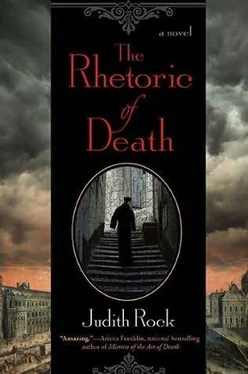Judith Rock - The Rhetoric of Death
Здесь есть возможность читать онлайн «Judith Rock - The Rhetoric of Death» весь текст электронной книги совершенно бесплатно (целиком полную версию без сокращений). В некоторых случаях можно слушать аудио, скачать через торрент в формате fb2 и присутствует краткое содержание. Жанр: Исторический детектив, на английском языке. Описание произведения, (предисловие) а так же отзывы посетителей доступны на портале библиотеки ЛибКат.
- Название:The Rhetoric of Death
- Автор:
- Жанр:
- Год:неизвестен
- ISBN:нет данных
- Рейтинг книги:3 / 5. Голосов: 1
-
Избранное:Добавить в избранное
- Отзывы:
-
Ваша оценка:
- 60
- 1
- 2
- 3
- 4
- 5
The Rhetoric of Death: краткое содержание, описание и аннотация
Предлагаем к чтению аннотацию, описание, краткое содержание или предисловие (зависит от того, что написал сам автор книги «The Rhetoric of Death»). Если вы не нашли необходимую информацию о книге — напишите в комментариях, мы постараемся отыскать её.
The Rhetoric of Death — читать онлайн бесплатно полную книгу (весь текст) целиком
Ниже представлен текст книги, разбитый по страницам. Система сохранения места последней прочитанной страницы, позволяет с удобством читать онлайн бесплатно книгу «The Rhetoric of Death», без необходимости каждый раз заново искать на чём Вы остановились. Поставьте закладку, и сможете в любой момент перейти на страницу, на которой закончили чтение.
Интервал:
Закладка:
When the students had fled and Beauchamps had staggered away, Jouvancy collapsed onto a wooden bench, leaned against the wall, and closed his eyes. Charles slumped down beside him, thinking how much he’d come to like the little priest and how much he wanted to stay in Paris. He turned his head slightly to see if Jouvancy had gone to sleep. The rhetoric master’s eyes stayed closed and Charles studied him. Grieving was leaving its mark. Jouvancy’s eyes were darkly shadowed and he was noticeably thinner than he’d been a week ago. Charles shook his head and leaned back against the wall. Philippe’s murder was eating at the whole college like a canker worm.
He half wished now that he hadn’t gone to the rector. He thought now that the man in the boots had likely been on his way to Guise rather than looking for Antoine. He’d used the old stairs, come so confidently through Guise’s rooms, seemed to know where he was going. And if the rector used what Charles had told him and confronted Guise, then Guise and the man would both be on their guard and harder to catch. Charles sighed. The chickens were out of the coop. He had gone to the rector. And whatever the rector said or didn’t to Guise, he was either going to send Charles away in disgrace or discipline him severely for his disobedience.
Which brought Charles face-to-face with the question he didn’t want to ask. If he felt so penned by his vow of obedience, what was he doing here? First a soldier, now a Jesuit, why did he keep putting himself into situations where obedience-often unquestioning obedience-was required? Because I’m an idiot, he told himself sourly.
True, said the cool-eyed part of him that stood perpetually aside from his feelings, the part that rose up to challenge him when he least wanted it. But leaving that sad fact aside, it went on, you know very well that without obedience there is no order. No justice.
Perhaps, Charles returned, yet just a few hours ago La Reynie told me that Louvois is merciless because of his passion for order.
Does that make all order evil? the cool-eyed part of him asked. Or is it the man who is evil because he has too much power and too little heart and mostly obeys no one? Because without obedience, you have only yourself. Do you know everything, see everything? Is your own will the right answer to every question?
No, all right, of course not, Charles thought irritably. But I’m still an idiot for going to the rector without stopping to think.
True, the unwelcome part of himself murmured, and left him in peace.
“Is something wrong, Maitre du Luc?” Jouvancy was watching him in concern.
Charles felt himself flush, hoping he hadn’t said any of his inner argument out loud. “No, mon pere. Well, yes,” he amended. “May I apologize again for being late, mon pere?” He had no quarrel with courtesy, one of obedience’s sweeter fruits.
“If you must.” Jouvancy smiled back.
“Thank you.”
They went on sitting, listening to a fly buzz lazily in the companionable quiet.
“Cistercians,” Jouvancy said into the silence, with the air of a man reaching a conclusion. “On the eighth of August, I shall join the Cistercians.”
“What? Why, mon pere?”
“No children. No Siamese delegation. No theatre.”
Charles laughed and then realized what Jouvancy had said. “Siamese delegation?”
“Pere La Chaise told the rector that they arrived yesterday at Berny-just outside the city. They will stay there until their presents for the king catch up with them. The king receives them at Versailles on September first.”
“But that’s not our concern, is it?” Charles said, puzzled.
“I didn’t tell you? The Siamese ambassadors are coming to our show.”
Charles slid lower on the bench. Just what they needed. Exotic-and no doubt bewildered-strangers from the other side of the world sitting in the front row and mesmerizing the student performers. French Jesuits had been talking for months now about the delegation, which was accompanied by the famous Jesuit mathematician Pere Guy Tachard. Siam’s King Narai was interested in foreign realms and foreign kings, and King Louis was very interested in elbowing the Dutch out of the center of Siamese trade. Pere Tachard wanted to strengthen the Jesuit mission in Siam and make a Christian out of King Narai. If the delegation needed entertainment, Charles had to admit that the Louis le Grand performance was a natural choice.
“I cannot wait to see them!” Jouvancy said, his pique evaporating. “They’re said to be little, amber-skinned men. Wonderful clothes, lots of gorgeous silk draped just so. I hear that everywhere they stay, the ladies crowd in to watch them eat their supper.” Jouvancy smiled sideways at Charles and raised his eyebrows. “The ambassadors offer fruit to the prettiest ones.”
“If our dancers and actors are as fascinated as the ladies, our show is in big trouble.”
Jouvancy grunted in agreement. The silence lengthened and Charles fell into a near drowse. “Maitre du Luc!”
“What?” Charles shot bolt upright and looked anxiously around.
Jouvancy had turned to face him, his eyes shining. “We can study the Siamese and make drawings, and have a Siamese entree in next year’s ballet!”
But I probably won’t be here next year, Charles didn’t say. “I thought you were joining the Cistercians, mon pere,” he said lightly.
“After we do the Siamese entree.”
They both burst out laughing. Glad for even a glimmer of humor in Jouvancy’s tired face, Charles shoved away his worry about his meeting with the rector and pulled the rhetoric master to his feet. They went companionably in search of a presupper glass of watered wine.
Chapter 18
Supper was pea soup, seasoned this time with clove and endive, and poured over thick, broth-soaked bread. To Charles’s relief, Pere Guise continued to ignore him, but even that didn’t help his appetite as his meeting with the rector loomed. By the time the refectory was dismissed, dread lay heavy in his belly. And weighed the more when he looked into the junior refectory to check on Antoine, and Antoine wasn’t there. As the boy’s tablemates filed out the door, Charles grabbed Maitre Doissin.
“Where is he?”
“Calm yourself, Maitre du Luc!” Antoine’s tutor shook his big shaggy head and gently disengaged his arm. “Antoine felt unwell, so I allowed him to stay in his chamber. The kitchen is sending something for him.”
“You left him alone?” Charles turned abruptly and pushed his way through the press of boys toward the door.
“No, no,” Doissin said, following him. “Not alone. Not really alone, the courtyard proctor promised to check on him.”
Charles made for the north courtyard, through the evening recreation hour’s games of tag and volleys of shuttlecocks. Suddenly Pere Guise was in his path.
“To the rector’s office,” Guise said through his teeth. “Now.”
Charles’s stomach lurched. Were Guise’s accusations of heresy and insinuations of murder going to be part of his meeting with the rector?
“After I find Antoine.” Charles started around Guise toward the north court.
“You will not find him there.”
“Why? What do you mean? Has something happened to him?”
Guise stalked toward the main building. Charles passed him and burst unceremoniously into the rector’s office. Antoine and Marie-Ange stood side by side in front of Pere Le Picart’s desk.
“Well,” Charles said, light-headed with relief, “if it isn’t Pitchin and Pitchot.” He wanted to throttle Guise for terrifying him. But what were the children doing here? Their fleeting smiles at the names of the folk tale characters vanished as Guise arrived and slammed the door behind him.
Читать дальшеИнтервал:
Закладка:
Похожие книги на «The Rhetoric of Death»
Представляем Вашему вниманию похожие книги на «The Rhetoric of Death» списком для выбора. Мы отобрали схожую по названию и смыслу литературу в надежде предоставить читателям больше вариантов отыскать новые, интересные, ещё непрочитанные произведения.
Обсуждение, отзывы о книге «The Rhetoric of Death» и просто собственные мнения читателей. Оставьте ваши комментарии, напишите, что Вы думаете о произведении, его смысле или главных героях. Укажите что конкретно понравилось, а что нет, и почему Вы так считаете.












